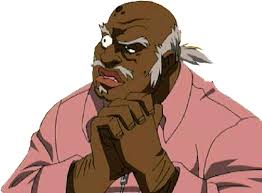
I always thought Uncle Ruckus—no relation was the most ridiculous and improbable character on The Boondocks. Uncle Ruckus is a grotesquely ugly black male character who despises and demeans all black people, blaming his “revitiligo” for making him appear black. He was certainly funny, but I couldn’t fathom how a black person could be so blatantly racist and cruel towards other black people. This perspective didn’t make much sense to me while living in a racially homogenous country, but that changed when I came to Europe.
Everyone is warned about white or brown-on-black racism, and while this kind is despicable and unjustifiable, it is almost expected. However, a more insidious form of racism we don’t discuss enough is black-on-black racism. And no, I`m not referring to African Americans or African Europeans being racist towards Africans. This, too, is reprehensible. I’m speaking about the average black person who has probably migrated just as you have but treats you differently than they would a white person. For instance, the black security guard at the local grocery store who suspiciously tails you while you shop because they have been conditioned to believe you might shoplift. Before you rush to defend these guards, understand that their vigilance is selective; white people do not receive the same treatment. The black receptionist who looks you up and down, doing everything but ‘receiving’ you to an organization they likely believe you have no right to visit. Yet, you see how warmly they greet other guests who are there for the same purpose as you—guests who are white. I am talking about the poor service and sometimes outright rude reactions from the black Uber driver, delivery person, and cashier, whom you observe providing stellar service to white clients. These subtle discriminatory practices are hard to explain to someone who hasn’t experienced them because they come with plausible justifications: they were only following you around the mall because they haven’t seen you shopping there before or because the last person caught shoplifting was black. You might be told you’re being overly sensitive to the receptionist’s behavior; they were only being cautious since no black people ever request to see senior management. And on it goes, with countless other rationalizations that make you doubt whether you’re reading too much into these actions or not.
Discussing this topic was quite frustrating, especially with people who had never experienced it. After some research, I discovered that internalized racism is indeed a real phenomenon. Karen Pyke defines it as a form of internalized oppression where racially subordinate individuals internalize racial oppression, involving both conscious and unconscious acceptance of a racial hierarchy that ranks certain races above others. This revelation helped me understand the seemingly absurd behavior of black people who were being racist towards other black individuals. It is somewhat similar to the self-stigma experienced by those with mental health conditions or by women enforcing patriarchal ideals on other women.
So, what’s next? For me, the simple realization that I wasn’t imagining things brought significant relief. If you think a black person is being racist towards you, another black individual, they probably are; it’s not all in your head. I used to blame and resent these Uncle Ruckuses, but now I recognize that they’re merely reflecting the prevailing societal racism. To address this issue, we must target its source. Karen Pyke suggests that by understanding internalized racial oppression and its mechanisms, we can shift blame from victims to the true beneficiaries of racial inequality and hold them accountable. This shift in perspective is crucial because it allows us to see that people perpetuating harmful behaviors are often themselves products of a larger, oppressive system. By focusing on the root causes of such behaviors—namely systemic racism and structural inequalities—we can create a more just society where people are judged by their character rather than the biases imposed by a racist system.


Succinctly put.